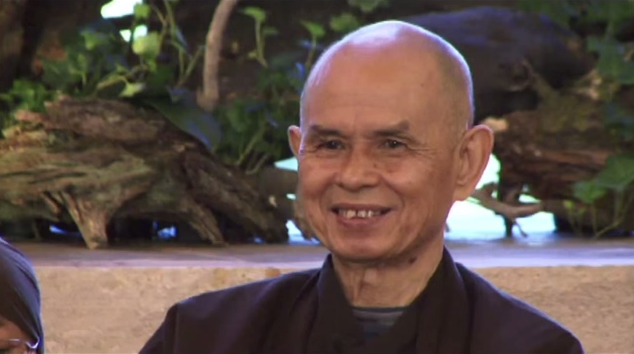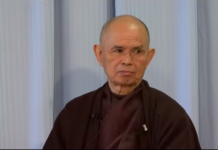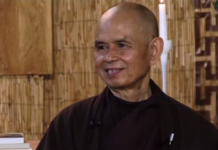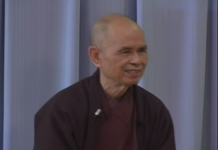 The Buddha is a teacher of true love, love for Mother Earth. It should be true love and if it is true love, it can bring a lot of happiness to you and Mother Earth. True love is also something that can help you to have more freedom. If romantic love is true love, it can also bring a lot of happiness. But if it is not true love, it will make you suffer and make the other person suffer.
The Buddha is a teacher of true love, love for Mother Earth. It should be true love and if it is true love, it can bring a lot of happiness to you and Mother Earth. True love is also something that can help you to have more freedom. If romantic love is true love, it can also bring a lot of happiness. But if it is not true love, it will make you suffer and make the other person suffer.
In the teaching of the Buddha, true love needs four elements. The first element maitri — loving kindness — is the capacity to offer happiness. If you cannot offer happiness, that is not true love. But when you are able to generate a feeling of joy and happiness within you, that’s true love. And if you and the other person also generate a feeling of joy and happiness, that is loving kindness. In romantic love, if you are not able to help the other person be happy, that is not true love. Without that, both will suffer. According to our teaching, it’s not difficult to create joy and happiness. Just breathe in and recognize the many conditions of happiness, and all that is available.
The second element of true love is karuna — compassion. Compassion is the kind of energy that can help remove and transform suffering in you and in the other person. We have learned there is an art of suffering. If you know how to suffer, you can suffer much less. You can make good use of suffering in order to fabricate understanding and love, and you can help the other person to suffer less and transform suffering in him or her. If you cannot transform and take care of the suffering in you and the other person, that is not true love. That’s why karuna should be cultivated by you and the other person. Romantic and not romantic, that’s not important. But true love and not true love, it’s important, right?
The third element of true love is joy — mudita. If by loving you make the other person cry all the time or you cry all the time, that is not true love (everyone laughs). Romantic or not romantic.
The fourth element of true love is upeksha — inclusiveness that you do not exclude. His suffering is your suffering. His happiness is your happiness. There’s no individual suffering and happiness anymore. In true love, there’s the element of inclusiveness and non-discrimination. It’s like bowing to the Buddha, and the one who is bowed to. There’s no separation or frontier between you and the other person, and that’s why communication is perfect. In that spirit, you cannot say “That’s your problem.” No. Your problem is my problem. My suffering is your suffering. This is true love, the fourth element of true love.
If romantic love has these four elements, it can also bring a lot of happiness. The Buddha never says negative things about true love. If you are successful in romantic love, then you will cultivate a lot of loving kindness and compassion. Very soon, your love will be all embracing. The other person is no longer the only object of your love because your love continues to grow, and your love will embrace all of us. Happiness becomes limitless, and that is the love of Buddha. That is the meaning of the fourth element of true love— inclusiveness. The element of inclusiveness makes you very free and happy, and makes your love unlimited. If it is true love, you begin with yourself and the other person, and if you continue with this practice of true love, your love will open and grow. Very soon you will include all of us in your love, and you do not exclude anyone anything from your love. It will continue to grow more and include not only humans, but also animals, vegetals, and minerals.
That is the love of the Buddha because he is able to help people suffer less, and his compassion is great. When we continue to practice, our karuna continues to grow and one day, it will be great love. Maha karuna. Maha maitri.
This was transcribed from a Q&A section with Thich Nhat Hanh in Plum Village, May 2014, and in Magnolia Grove, September 2013.




















I often wonder what is true love and how do I know when true love arrived. This article is very helpful, especially about the fourth element. I have a huge ego which I’m trying to tame. Through the fourth element explanation, I can separate the his from mine. It’s a practice I will definitely cultivate so I can bring joy, laughter, and happiness to our love.